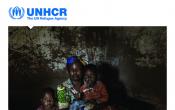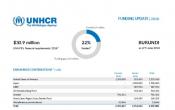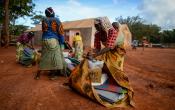Burundi
Operation: Burundi
Location
{"longitude":30,"latitude":-3,"zoom_level":8,"iso_codes":"'BDI'"}
By clicking on the icons on the map, additional information is displayed.
Key Figures
| 2017 year-end results | |
| 100% | of returns were voluntary, and conducted in safety and dignity |
| 100% | of people of concern were living within 200 metres of safe access from a water point |
| 98% | of population of concern were vaccinated against measles |
| 89% | of primary school-aged children were enrolled in primary education |
| 2018 planning figures | |
| 15,000 | returning Burundian households will receive cash grants |
| 300 | people of concern with specific needs will receive support (non-cash assistance) |
| 250 | grams of soap will be distributed monthly for eachrefugee and asylum-seeker |
| 20 | litres of potable water will be available per person per day |
| 10% | of children (6-59 months) suffer from global acute malnutrition |
Latest Updates and Related Links
People of Concern
147%
Increase in
2016
2016
| 2016 | 208,049 |
| 2015 | 84,399 |
| 2014 | 138,111 |

[["Refugees",57469],["Asylum-seekers",3613],["IDPs",141221],["Returned refugees",4117],["Stateless",974],["Others of concern",655]]
Loading ...
Burundi
< Back
2017
{"categories":[2013,2014,2015,2016,2017,2018],"budget":[31.54391216,25.31822673,33.021793127,34.53884162,33.81553606,30.92459514],"expenditure":[22.90897204,20.51341054,15.61407482,17.32505948,19.60250263,null]}
{"categories":[2013,2014,2015,2016,2017,2018],"p1":[30.24224219,23.3993674,18.676158177,28.50049693,29.42440961,28.57898179],"p2":[0.61934524,0.36923053,0.18940178,0.92834469,0.007075,null],"p3":[null,null,null,null,null,null],"p4":[0.68232473,1.5496288,14.15623317,5.11,4.38405145,2.34561335]}
{"categories":[2013,2014,2015,2016,2017,2018],"p1":[21.96405858,18.59464165,14.14254743,15.49302301,17.78705999,null],"p2":[0.52827801,0.36918882,0.13616865,0.1221779,null,null],"p3":[null,null,null,null,null,null],"p4":[0.41663545,1.54958007,1.33535874,1.70985857,1.81544264,null]}
Loading ...
CHOOSE A YEAR
- 2014
- 2015
- 2016
- 2017
- 2018
Operational context
Security incidents, political tension financial sanctions and rising food insecurity in Burundi led the deterioration of the humanitarian situation in 2017. UNHCR was however able to operate freely across the country.Some 175,000 people were displaced within Burundi and around 430,000 Burundian refugees were hosted in neighbouring countries. The number of Burundians fleeing their homes more than doubled in 2017, compared to 2016.
The situation in Burundi remained such that UNHCR could not comprehensively encourage or promote returns. However, UNHCR supported the voluntary return of 13,000 refugees from the United Republic of Tanzania to Burundi during the period of September to December 2017.
Burundi has maintained its open door policy to asylum-seekers from the DRC, welcomed nearly 66,000 refugees and asylum-seekers at the end of 2017.
Chronic underfunding of the Burundi situation severely hampered the humanitarian response and the quality of assistance provided to the refugee population in asylum countries, particularly in the areas of: reception and registration; child protection; access to education; measures to combat SGBV; shelter; and food security.
Population trends
In 2017, Burundi hosted more than 62,300 refugees and some 3,500 asylum-seekers. Some 27,200 people of concern are residing in urban environments, while close to 38,700 are in the four camps of Bwagiriza, Kavumu, Kinama and Musasa. Furthermore, there were close to 175,000 IDPs and 970 stateless persons. During the year, close to 13,200 refugees returned to Burundi.Key achievements
- Following a tripartite meeting in the United Republic of Tanzania between the Governments of Burundi and the United Republic of Tanzania and UNHCR in August 2017, some 13,000 Burundian refugees repatriated on a voluntary base between September and December 2017.
- As a response to the country-wide malaria epidemic, more than 5,000 impregnated mosquito nets were distributed to Burundian returnees and over 10,000 mosquito nets to refugees across the four camps.
Unmet needs
- The chronic malnutrition rate is considered as critical (exceeding WHO’s threshold of 40.5%) and could be explained by the massive influx of new refugees and also by the elimination of cash assistance which allowed refugees to diversify their food intake.
- The lack of infrastructure remains as the primary cause to a limited access to quality education for refugee children. Classrooms are of poor quality and overcrowded in all four camps, with an average of 80 students per class in primary and secondary school.
- The increase of the cost of the briquettes resulted in the reduction of the amount distributed to each household. Although other sources of energy were being explored, briquettes remained the only viable option. Some households had to resort to using firewood or charcoal, which often causes conflicts between the refugee and the host populations and exposes refugees to SGBV risks.
Working environment
UNHCR declared Burundi a Level 2 emergency in May 2015 when political conflict caused over 200,000 person to flee to neighbouring countries. It is expected that some of these people will return to Burundi in the course of 2017. In 2017 UNHCR and its partners plan to assist 80,000 refugees, 25,000 internally displaced people, and 25,000 spontaneous returns. Between 10,000 and 50,000 asylums-seekers are estimated to arrive following the elections in the Democratic Republic of the Congo (DRC). Reservation to the 1951 Convention relating to the Status of Refugees remains, although in April 2015, the Government adopted two bills relating to the 1954 and 1961 Conventions regarding statelessness. UNHCR maintains strategic partnerships and closely collaborates with the Burundian Government, other United Nations agencies and a range of partners with regard to national programmes.Key priorities
In 2017, the operation will focus on:• Ensuring access to asylum procedures;
• Protection against refoulement;
• Upholding the civilian character of camps;
• Promoting empowerment through income-generating activities;
• Working with the Government to encourage the integration of persons of concern in public schools and the adoption of the national curriculum in Burundian schools.
Funding shortfalls would have a significant impact on protection activities. The security of the people of concern in the camps will be at risk in if there is no regular presence of police officer to ensure that activities of assistance and protection are provided and the civilian and humanitarian character of the camps is maintained.


